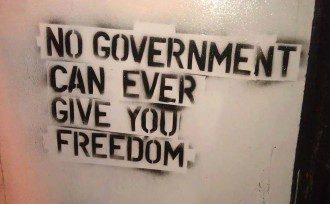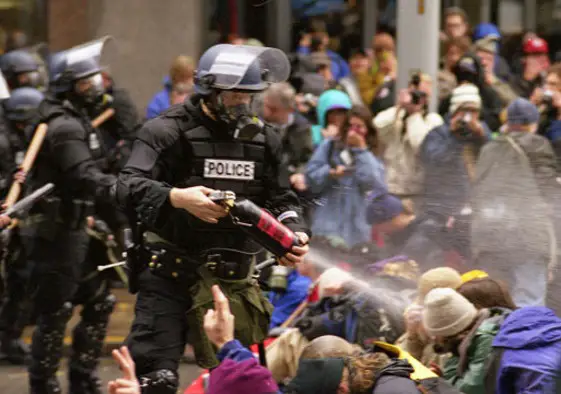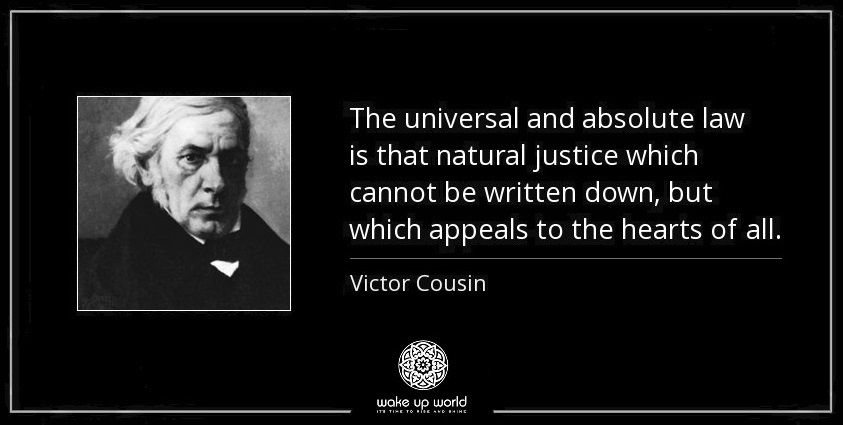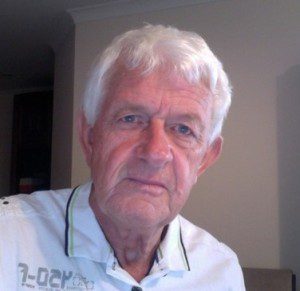By Ken Bartle
Guest writer for Wake Up World
Today’s mindset cannot see past the security, comforts, and benefits of government, despite its citizens being bound into a life of slavery. Man strives for freedom, but has not yet discovered a political system without political rule.
A representative body acting as public guardian of natural law, can answer people’s protection, security and natural justice, without political rule, provided that it cannot ever be usurped and transformed into government. Kritarchy and Natural Law offer the method.
No government? Oh yes!
[pro_ad_display_adzone id=”110028″]
Today’s mindset, common as grains of sand on a beach, argues that government is needed to take care of us. That it does the exact opposite seems not to matter in the slightest. The mindset of holding tight to Big Brother’s benefits is the problem. It’s Man’s mindset of dependency. Without political rule, people point to anarchy as the certainty of more chaos, disturbance and increased criminality. It’s not because that outcome is certain, rather that it relieves one’s abject fear of having to rule themselves, fend for themselves, become independent. They want to be saved from sloth and apathy; have something or someone provide for them, never considering at whose expense, even their own. Deeper and more fundamental, an emotional reason exists, one concerning wellbeing and security.
Some know that anarchy truly means the absence or non-recognition of authority or other controlling systems. Among these folk, some will have learned of Minarchy, which means strictly limited government. Fewer still will have heard of Kritarchy.
Kritarchy is a political system without political rule. Think about that! Is there a contradiction? Is it even possible? Or have we been mentally seduced to believe that rule without government is utterly impossible, expressly to make sure that authoritarian rule and Man’s slavery continues? Has our mindset been ruled? Have we become so mentally blinded, that no ‘rule’ can exist, save ‘government rule?’
Kritarchy answers yes, but first let’s look at Anarchy and Minarchy.
Anarchy.
Some regard the absence of government and absolute freedom of individuals, as a political ideal. By far most people (falsely) consider that such permits a state of disorder, due to absence or non-recognition of authority. Anarchy’s origin is mid 16th century: via medieval Latin from Greek anarkhia, from anarkhos, from an- ‘without’ + arkhos ‘chief, ruler.’ Absence of a ‘chief ruler’ seems to imply that Man will run amok without someone controlling his behaviour. Self control is a fiction, it seems. The subject of Anarchy often gives way to Minarchy…
Minarchy.
Minarchism (also known as minimal statism) is a political philosophy holding that minimal government is essential, whose only legitimate function is to protect individuals from aggression, theft, breach of contract, and fraud, through the governmental institutions of the military, police, and courts. Minarchy also allows for fire departments, prisons, the executive, and legislatures as legitimate government functions.
Its central tenet is that the state has no authority to use its monopoly of force to interfere with free transactions between people, and to ensure that the state’s sole responsibility is to protect people and contracts between private individuals and property, through law courts and systems of enforcement. Minarchism is the premise of much libertarian thought.
Minarchists often gravitate toward Anarchism, and vice versa. Both find their greatest disagreements in the the role of the state. Did I mention that ‘rule,’ (read government) is locked into our mindset?
Diligent students of these topics will discover Kritarchy. Likely however, they will turn aside and return to anarchy or minarchy, since Kritarchy also upholds ‘rule,’ least as it is most commonly, but erroneously, described.
It does rule, and it does not, as I’ll explain.
Kritarchy.
Kritarchy is a political system without political rule? It was firmly established in medieval Ireland until the middle of the thirteenth century, and in Frisia into the sixteenth century. In the first half of the nineteenth century, European immigrants who settled in the Midwest and the Far West of North America developed their own brand of kritarchy. No history of Kritarchy exists in the 20th and 21st century.
Google shows that the most common definition of Kritarchy is ‘Rule by Judges.’ Anarchists, monarchists and libertarians give up at this point. Rule by Judges, is rule, in their minds, period.
If so, then how on earth can Kritarchy be a political system without political rule? Did I mention that ‘rule,’ (read government) is locked into our mindset?
For Man, or of Man?
Before putting Anarchy and Minarchy aside, since much literature serves both, a question remains: Which of those two best accommodates the nature of Man, his unalienable rights, natural law, morality and natural justice.
The answer is neither, because both portend a solution “for” Man, instead of one which arises from “out of” Man. This distinction is absolutely crucial, made more so by this next distinction.
Frank van Dun, (Philosopher of Law in the Netherlands), explains that “according to its etymological roots, a kritarchy is a political system in which justice (more exactly the judgment that seeks to determine justice) is the ruling principle or first cause. He further describes that the term ‘kritarchy’, compounded from the Greek words ‘kritès’ (judge) or ‘krito’ (to judge) and ‘archè’ (principle, cause), is attributed to the English author Robert Southy, in 1844.” The operative words are ‘judge, principle, and cause.”
Justice is the ruling principle.
The common definition of Kritarchy, known as ’Rule by Judges,’ is shown false and turned on its head. As van Dun describes, determination of justice is the ruling principle, or first cause. Do you see the distinction?
Judges do not rule – Justice rules.
Justice arises out of the nature of Man, what he is, the natural laws of his own being. Justice is ‘of’ Man, therefore, and cannot be other without it serves injustice. Justice is of nature and ruled by it. It is not the rule of legislators nor judges. Justice is for Man to discover, practice, and remedy any violation of, so to protect Man’s unalienable right to his life, his body, and the property of his efforts.
A political system without the institution of political rule.
A political system without the institution of political rule, even if considered as ‘the rule of judges’, must absolutely deny judges any and all particular privileges or special powers. Their ‘commission’ is not to invent justice, or ‘rule’ by statute, but to administer existent justice, inherent in nature herself. No one decides justice, it just is. It is the natural order of things, natural law.
No government.
By this reckoning there can be no government, as we know it. In a short, but masterful historical description, van Dun tells how the original ideas concerning natural law have been twisted so that … “wealth and welfare were taken to be the true ‘natural rights’ of men, and ‘justice’ was re-interpreted to mean the efficient production and ‘fair’ distribution of wealth.”
Further, that “At the end of the second millennium before Christ, the Jews lived in a system described in the biblical book of [the] Judges. Their ‘judges’ were not judges as we understand our modern legal systems. Instead they were “influential respected men (and women, I trust) who provided leadership and counsel, with no power to coerce, tax, or write laws that infringed natural justice.”
Rule and justice — from Man’s nature.
Kritarchy, as van Dun describes, offers an accused individual the opportunity to choose their own judge. Think very hard about that, because it means, ultimately, that any injustice will necessarily hasten its own demise. Justice will prevail. I urge that you read van Dun’s article; a powerful argument for Man’s freedom, from a Philosopher of Law.
Man’s protection and security without the institution of political rule, boils down to ‘self rule’, not the absence of rule. I prefer the phrase ‘self management,’ simply because the word management implies consistent adjudication of one’s actions, rather than application of a fixed mandate, policy, dictate or rule. In other words, one manages their own justice, as the ruling principle, or first cause of their life. One employs ethics to administer their own morality, the act of living as they choose, respectful of the equal rights of others, as I’ve set forth in two publications, and in the Declaration of Individual Rights.
Comfortable justice vs clinical justice.
Is self administered justness adequate? Will it satisfy? Is it conceivable that Man will give up the security he perceives is offered by government, to willingly accept full self responsibility for his life in harmony with others?
I think not, least presently. Whatever freedom Man may wish for, or implore, he will fight to retain some tangible form of security, an instrument of ‘comfort,’ if you prefer. The reason why anarchy is so reviled, is because it seems to strip Man of comfort and security. One easily feels exposed, vulnerable, forced to grapple with issues that are too big. Chaos and increased criminality are considered to be certain, if individuals cannot protect themselves from a gang of thugs, absent a police force; read absent government.
Confession of guilt.
Humans necessarily have the right to think, speak, judge, make choices and act, else they cannot support and maintain their own life. Whosoever denies these rights to any human individual, unambiguously denies his very own being. (Free will is localised within, not ubiquitous free licence.) Such violation of Man’s rights confesses that the denier has willfully renounced his own rights, thereby making him/herself an outlaw.
Guilt status applies to all made-for-Man statute laws, because all run roughshod over natural law.
Does it surprise that a democracy must necessarily and constitutionally outlaw all independent protections of natural rights, so as to ensure that no natural rights can be invoked against the legal rights of its democratic rule? Democracy must protect against its own confession of guilt. So it does, through many means, corporatisation being one. Linguistic perversion, inherent in the phrase ‘natural persons,’ is another.
Enforcement agencies.
‘Free market’ courts and police forces, in a kritarchy, are not above natural law and justice as the ruling principle. Nevertheless, judges risk being charged with unlawful behaviour in another court, should they deprive others of their freedom or other rights, when natural justice does not require it. Judges are beholden to be ‘just,’ as are all.
Here’s a burning question. If courts and police forces, are not above natural law and justice as the ruling principle, what requires they be competitors in a free market? What competitor can exceed true justice? Why cannot courts and police forces, in abutting jurisdictions, not be co-operative, if their (just) missions are respectfully identical to the letter? What competition can possibly exist if justice is founded upon Man’s nature, his natural individual rights, and not of some bureaucrats (statute) whim interpreted by a judge? (Also see ‘anarcho-capitalism’ at the foot of that page.)
Competition cannot exist save by justice not being properly served on occasions.
Re-trial — no appeal
Thus it remains that a courts consideration of the evidence may not always serve justice. No adjudicator is perfect. What appeal for justice exists, then, if no competition exists. Because justice rules, not its administrator, a re-trial can be held in such cases, and should. Its purpose is not to overturn an adjudication of justice, but to newly consider evidence from the beginning, without such reference. Justice, based on evidence is examined. What someone prior interpreted or adjudicated to be just, is immaterial.
To this end, van Dun seems to agree with my conclusions. He submits that a competitor might be “a cooperation of several of its competitors. It might also be a parliament, i.e. a representative body that acts as a public guardian of the law.”
Look no further!
Freedom and security denied.
Creator intended we would (self) authorise and enact our own comforts and security, and to that end, endowed every means of its achievement. But no! Man has effectively spat in Creator’s face and legally authorised a government body to enact and deliver governments that secure comforts and security unto itself, not unto Man; this criminal insanity necessarily coercing and enforcing that Man must sacrifice himself to the common good of all; ultimately to his slave masters.
Unbeknown to itself, government has engineered its own demise. Bloated by its own insatiable, bloody-minded authority, blinded by its own malevolent, insolent insanity, its day of reckoning hastens, by no other hand than its own.
Emotional attachment to Justice.
A public guardian of the law is what government was intended to be, but never delivered. It did not fail abysmally. It succeeded criminally!
Substitute natural law for ‘legal positivism.’ Substitute natural justice for legal contrivance. Substitute individual rights for human rights. Distinguish living human beings from ‘Natural Persons.’ Substitute Man’s protection, security and justice without the institution of political rule and the job is done.
The phrase, “a representative body that acts as a public guardian of the law” put forward by van Dun, best describes my proposal for a “Commission of Justice,” as another alternative to government. Unlike kritarchy, this overcomes the lack of an identifiable body of ‘security’ that people can mentally and emotionally attach to.
Elected to administer justice, protect Man’s body and his unalienable rights, its core premise is that it can only ever protect and administer natural justice; not one thing more, ever, period! It is forbidden, by the natural laws of Man, any opportunity to decree its version of justice contrary the nature of Man. Whosoever rules justice as other than ‘of’ Man, is automatically terminated (fired) by their own publicly declared choice to violate Man’s rights. Guilt is self confessed!
Protection without rule.
Such ‘Commission of Justice,’ (or like-named body) is tasked to arrest unjust actions, so to restore justice. Its focus is restorative justice, not punitive justice, such as we have today. Tasked to assess whether or not, one individual has violated another’s right to pursue their own life without interference, it arrests actions that violate one’s right to life and the sustenance of it, including one’s right to the property of one’s efforts.
As an instrument of Man’s protection, foremost, it must protect itself from usurpation, no exceptions. It must protect against all contrary ‘authority,’ and any denial of natural justice, all inclusive. Its forbidden powers are described in Section 9.
By such means, folk have a tangible and emotional attachment to a political body of security, that protects their rights, lives and property, inherently debarring any and all political rule or domination. Government is rendered redundant, physically, mentally and spiritually, and good riddance!
Justice rules.
There is another fundamental difference between present legal/judicial systems and a representative body acting as a public guardian of the law, founded on natural law and natural justice. Today’s legal/judicial systems protect themselves by way of the public ‘office’ making a ruling, not a living being. Conversely, any human being who is a public guardian of natural law and justice, and who oversees whether or not the presented evidence upholds justice or violates it, is not so protected. Recognising this fact a judge is morally obliged to adjudicate natural justice, not their interpretation of it.
Was a felony committed or not? What right of Man was violated or infringed? Name it. Do not pontificate. Adjudicate actions, do not evaluate morals. Be objective, not subjective. Facts prove justice or injustice, nothing else.
The only matters that can be ‘heard’, are those involving violation of natural law, natural rights, and initiated violence. Nothing else is relevant. Man’s nature is the reference base, not statute law. Willfully chosen acts, once proven, are one’s guilt, made publicly known upon evidential proof that a crime has been committed. A judge does not rule a guilty verdict. Proven crimes expose guilt, in themselves. Contractual breaches can only be adjudicated on the same basis, one living being’s breach of contract to another living being’s detriment, wherein written contract terms and proof of harm are the only determinants. Any violence that may have been committed is of natural law, not contractual agreement.
Whatsoever organisation of justice is forbidden any means of violating itself, without self destructing, has no alternative but to build up a solid reputation for justice. Government, that rigidly enforces its own preservation at everyone’s expense, is the polar opposite.
Life without Fear — with no government.
Chaos, turmoil, emotional trauma and destruction result from lack of true knowledge and understanding, and from a lack of wisdom. If F E A R is indeed the acronym of False Evidence Appearing Real, then truthful evidence is most needed.
Belief in the presumption that people are incompetent and incapable of managing their own lives, is the very thing that perpetuates it. Given a body of security, electively commissioned by people to protect their unalienable right to life, their body, and inalienable right to their property, and forbidden all else bar none, Man’s fear of self governance vanishes; at least it should.
Life with no Government?
Time has come for Man to redeem his unalienable right to life, smash bogus dependency and authoritative rule, eliminate fear and begin living as Creator intended, self governance prevailing.
About the author:
Ken Bartle is the researcher and editor of the Absent limits website, including its publications and articles. He writes on the many aspects of truth, freedom, individual rights, natural law, natural justice, and Man’s conscious processes.
Prompted by decades of study into Objectivist philosophy he concluded that government could never adjudicate natural law and natural justice, because every law that it wrote would at some point override someone’s free will. Government could never satisfy, majority consensus or otherwise. His first work on this website was the Declaration of Individual Rights as articles 1 & 2 in the Constitution of Man.
His proposal for a Commission of Justice offers an alternative to government. Alerted to the work of Larken Rose, Mark Passio, the works of Frank van Dun, Philosopher of Law, and others, Ken’s explanations of Natural Law continue to develop and enlighten. Setting out to explore Mans mental faculties as the inherent origins of natural law, his new works entitled Student of Mind and Master of Consciousness, describe techniques for programming one’s subconscious mind, now gaining traction from other sources. Ken pursues this study based on its great promise for Mankind.
Learn more at www.absentlimits.net
This article originally appeared on www.absentlimits.net, reproduced with kind permission.
Further reading from Ken Bartle on Wake Up World:
[pro_ad_display_adzone id=”110027″]











